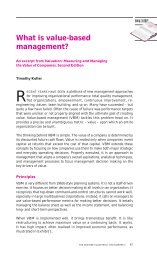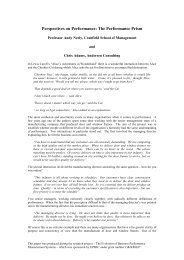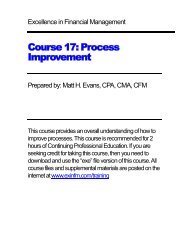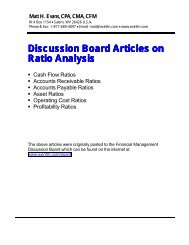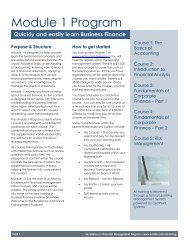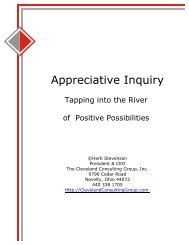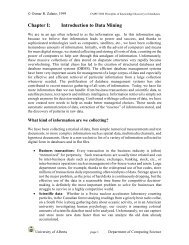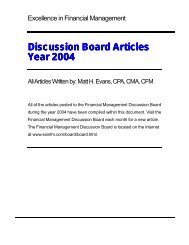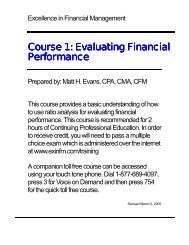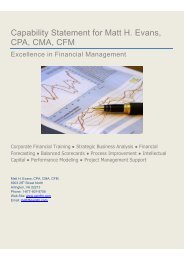Short Articles (PDF) - Excellence in Financial Management
Short Articles (PDF) - Excellence in Financial Management
Short Articles (PDF) - Excellence in Financial Management
Create successful ePaper yourself
Turn your PDF publications into a flip-book with our unique Google optimized e-Paper software.
6. The environment will be treated as a silent stakeholder, a party to which the<br />
company is wholly accountable.<br />
7. A company will strive for balance, diversity, and equality <strong>in</strong> its relationships with<br />
workers, customers, and suppliers.<br />
8. A company will pursue <strong>in</strong>ternational trade and production based on respect for the<br />
rights of workers and citizens of trade partner nations.<br />
“Truth be told, the corporate crisis is as much spiritual as it is f<strong>in</strong>ancial. Yes, fortunes<br />
are won or lost on the ability to anticipate trends and create products that meet these<br />
demands. But capitaliz<strong>in</strong>g on <strong>in</strong>novation is not enough today. A company’s success<br />
also h<strong>in</strong>ges on whether <strong>in</strong> the eyes of its employees and the public it honors a<br />
common sense of justice.”<br />
- Sav<strong>in</strong>g the Corporate Soul by David Batstone<br />
The marketplace and bus<strong>in</strong>ess are usually driven by “commercial” type decisions.<br />
However, people are not necessarily driven by commercial or bus<strong>in</strong>ess related<br />
values. Individuals and organizations need to take it upon themselves to set a moral<br />
compass that is not driven strictly by commerce. Bus<strong>in</strong>esses can take several steps<br />
to establish a moral compass – transparency and honesty <strong>in</strong> report<strong>in</strong>g f<strong>in</strong>ancial<br />
results, assum<strong>in</strong>g responsibility for bad decisions, shar<strong>in</strong>g of wealth to all, service to<br />
community, humaniz<strong>in</strong>g the workplace, and other decisions of <strong>in</strong>tegrity.<br />
“A value is a belief <strong>in</strong> action. It is a choice about what is good or bad, important or<br />
unimportant. Values shape behavior. Until a value is acted upon it rema<strong>in</strong>s an<br />
aspiration. Values are hard to detect; yet they underp<strong>in</strong> organizations like the<br />
foundations of a house. If the foundation is weak, then the house falls down.”<br />
- Unlock<strong>in</strong>g Organizational Values by Dave Francis and Mike Woodcook<br />
Ethics is about the choices we make – the wisdom we display through our decisions,<br />
and ethics ultimately def<strong>in</strong>es how we want to live – the standards of acceptable<br />
behavior that tells the world what is right. When we do these “right th<strong>in</strong>gs” we create<br />
strong, susta<strong>in</strong>able relationships with our stakeholders, creat<strong>in</strong>g positive value for<br />
everyone. Thus, the connection between value and ethics!<br />
F<strong>in</strong>ally, what success represents to the “ethical” bus<strong>in</strong>ess leader may contrast<br />
sharply with the typical bus<strong>in</strong>ess leader. The typical bus<strong>in</strong>ess leader is often preoccupied<br />
with meet<strong>in</strong>g the numbers, defeat<strong>in</strong>g the competition, and be<strong>in</strong>g on top.<br />
Ethics is more concerned with do<strong>in</strong>g the right th<strong>in</strong>gs, not look<strong>in</strong>g at bus<strong>in</strong>ess <strong>in</strong> terms<br />
of profits and f<strong>in</strong>ancial results, but creat<strong>in</strong>g a sense of dignity and prosperity for<br />
everyone touched by the bus<strong>in</strong>ess.<br />
“Gett<strong>in</strong>g bus<strong>in</strong>ess’s ethical house <strong>in</strong> order starts with people. Consider that ethical<br />
transgressions can occur on countless levels. As social psychologists, we look at two<br />
variables, the environment and the person. Consider how your ethical miscues can<br />
affect people – employees, colleagues, and superiors, suppliers, customers, <strong>in</strong>ternal<br />
regulators (lawyers, auditors, the board of directors), external regulators<br />
50



